Examining the Effectiveness of the Data Protection Act 2018 in UK
VerifiedAdded on 2023/06/11
|9
|2452
|81
Essay
AI Summary
This essay provides a detailed overview of the Data Protection Act 2018 in the United Kingdom, examining its provisions, offences, and effectiveness in protecting personal data and combating cybercrime. It discusses the Act's origins, implementation, and key aims, including compliance with GDPR standards and addressing the challenges posed by Brexit. The essay also outlines the rights of individuals regarding their data, the responsibilities of organizations, and the role of the Information Commissioner's Office (ICO). Furthermore, it explores potential improvements to the Act to enhance its effectiveness in addressing evolving cyber threats and ensuring justice for victims of data breaches, highlighting the importance of robust data protection measures in the digital age. Desklib provides access to this and other solved assignments.
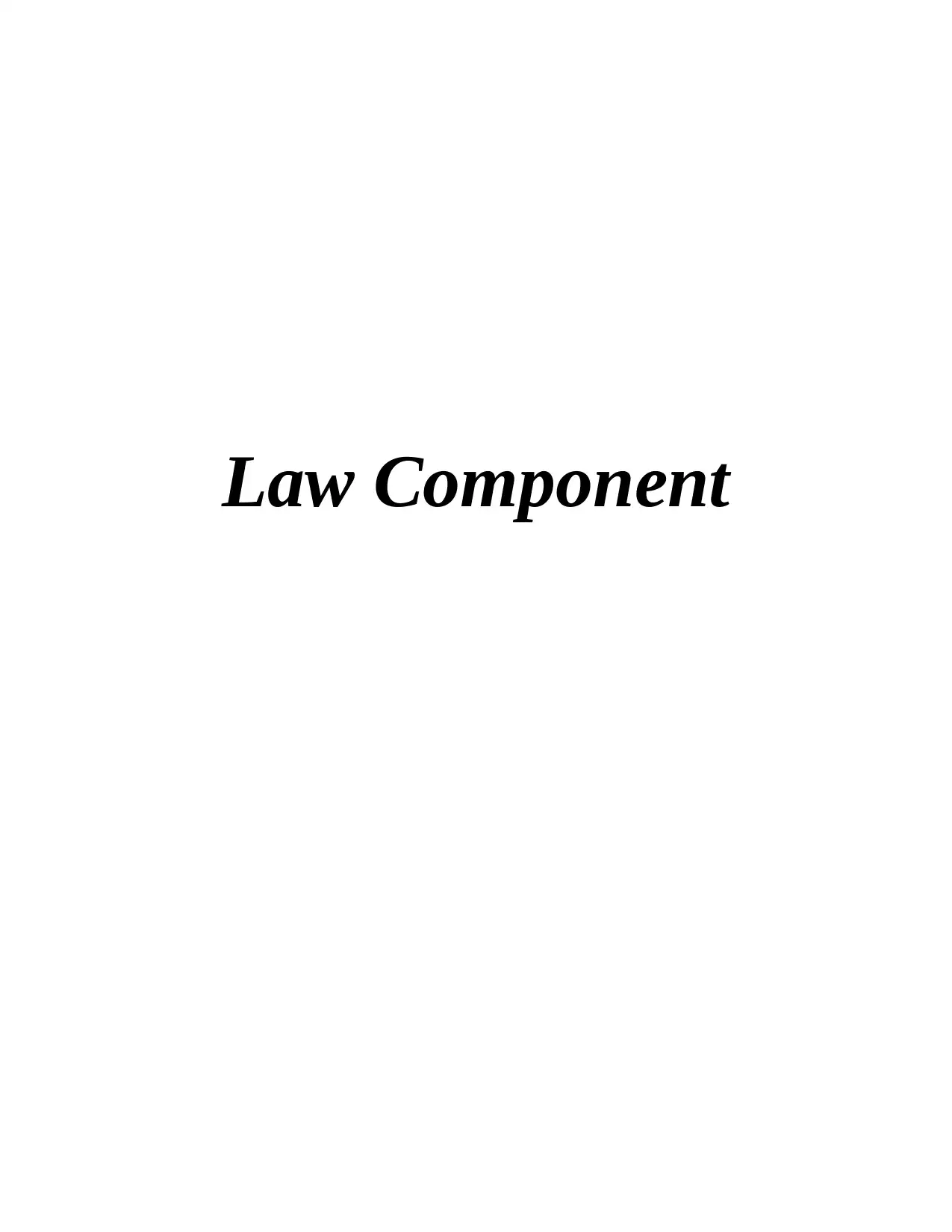
Law Component
Paraphrase This Document
Need a fresh take? Get an instant paraphrase of this document with our AI Paraphraser
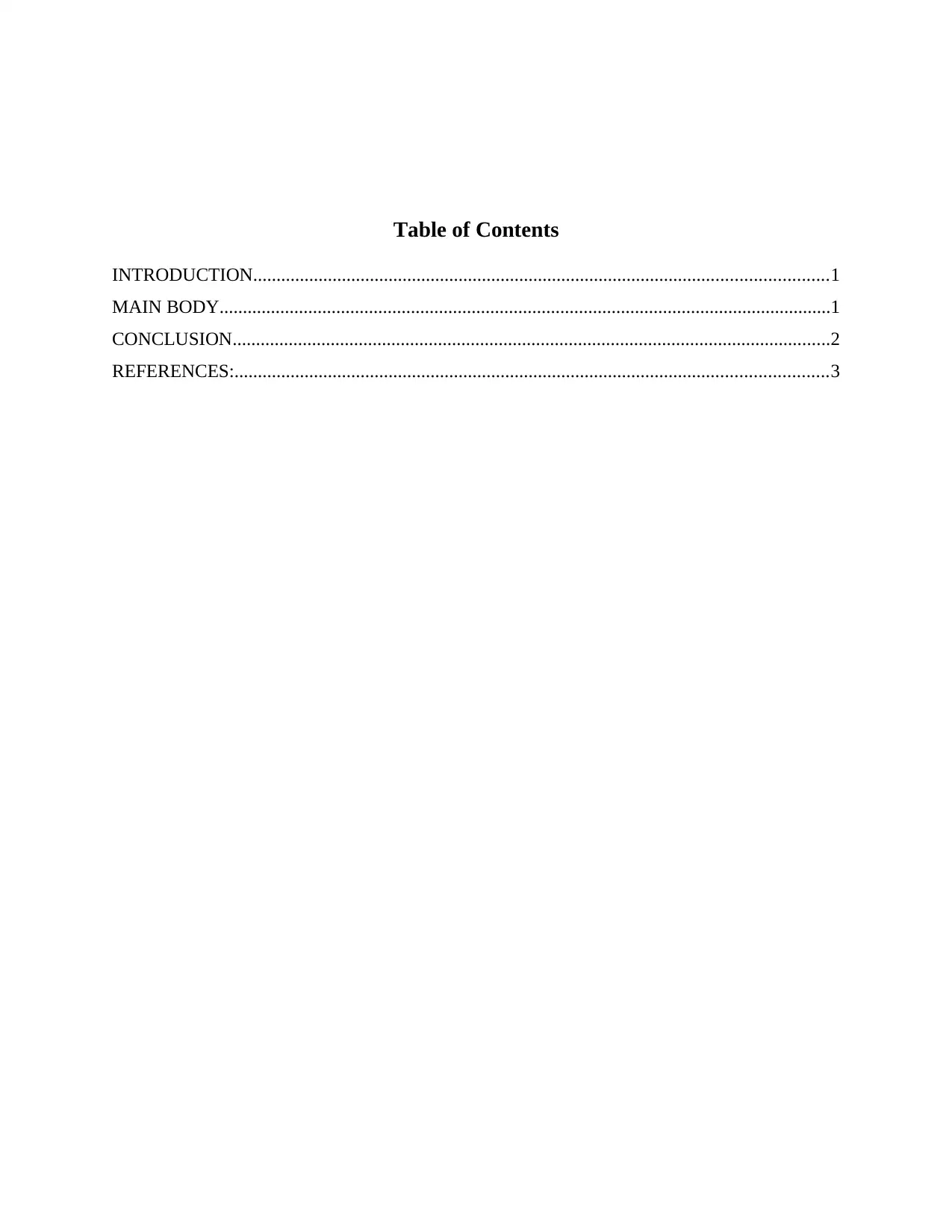
Table of Contents
INTRODUCTION...........................................................................................................................1
MAIN BODY...................................................................................................................................1
CONCLUSION................................................................................................................................2
REFERENCES:...............................................................................................................................3
INTRODUCTION...........................................................................................................................1
MAIN BODY...................................................................................................................................1
CONCLUSION................................................................................................................................2
REFERENCES:...............................................................................................................................3
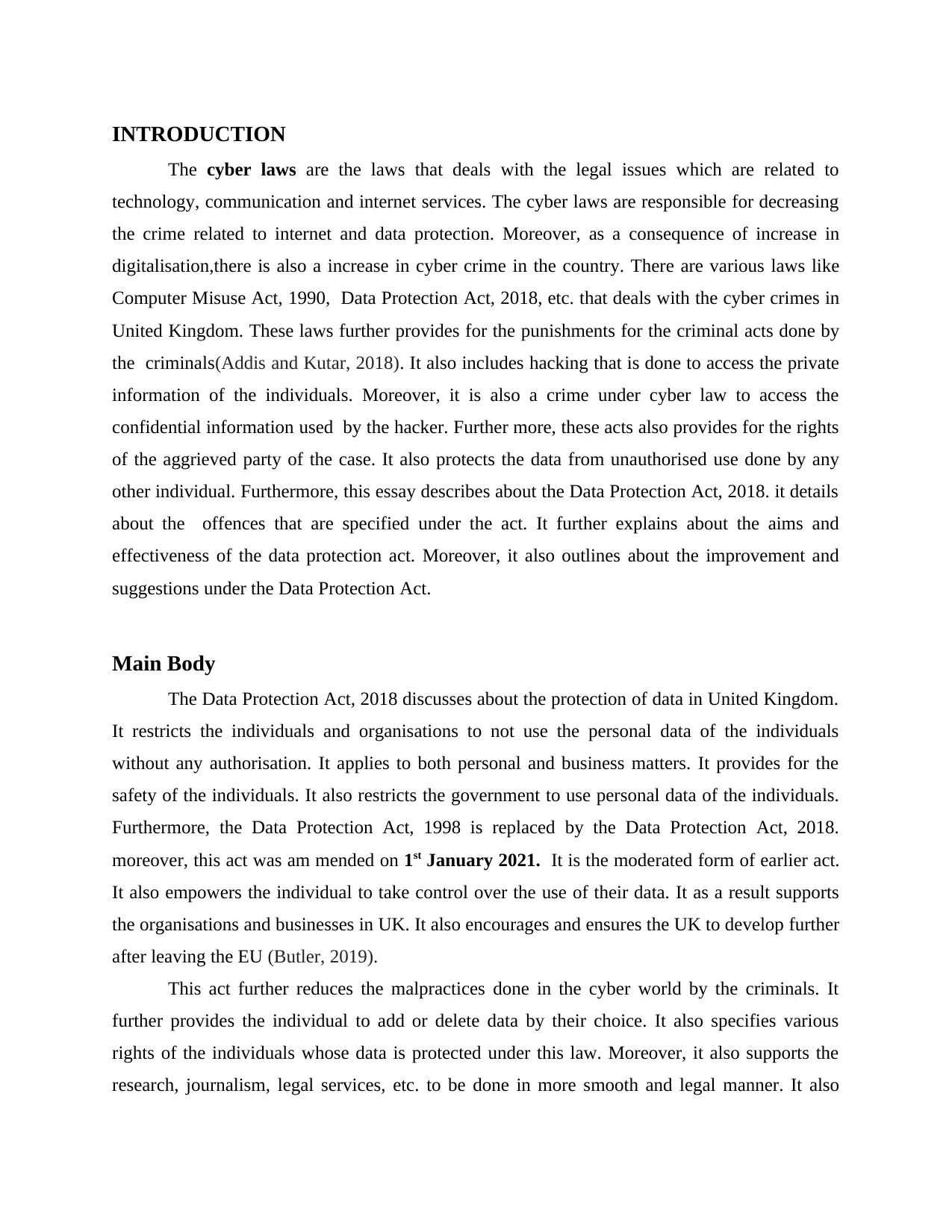
INTRODUCTION
The cyber laws are the laws that deals with the legal issues which are related to
technology, communication and internet services. The cyber laws are responsible for decreasing
the crime related to internet and data protection. Moreover, as a consequence of increase in
digitalisation,there is also a increase in cyber crime in the country. There are various laws like
Computer Misuse Act, 1990, Data Protection Act, 2018, etc. that deals with the cyber crimes in
United Kingdom. These laws further provides for the punishments for the criminal acts done by
the criminals(Addis and Kutar, 2018). It also includes hacking that is done to access the private
information of the individuals. Moreover, it is also a crime under cyber law to access the
confidential information used by the hacker. Further more, these acts also provides for the rights
of the aggrieved party of the case. It also protects the data from unauthorised use done by any
other individual. Furthermore, this essay describes about the Data Protection Act, 2018. it details
about the offences that are specified under the act. It further explains about the aims and
effectiveness of the data protection act. Moreover, it also outlines about the improvement and
suggestions under the Data Protection Act.
Main Body
The Data Protection Act, 2018 discusses about the protection of data in United Kingdom.
It restricts the individuals and organisations to not use the personal data of the individuals
without any authorisation. It applies to both personal and business matters. It provides for the
safety of the individuals. It also restricts the government to use personal data of the individuals.
Furthermore, the Data Protection Act, 1998 is replaced by the Data Protection Act, 2018.
moreover, this act was am mended on 1st January 2021. It is the moderated form of earlier act.
It also empowers the individual to take control over the use of their data. It as a result supports
the organisations and businesses in UK. It also encourages and ensures the UK to develop further
after leaving the EU (Butler, 2019).
This act further reduces the malpractices done in the cyber world by the criminals. It
further provides the individual to add or delete data by their choice. It also specifies various
rights of the individuals whose data is protected under this law. Moreover, it also supports the
research, journalism, legal services, etc. to be done in more smooth and legal manner. It also
The cyber laws are the laws that deals with the legal issues which are related to
technology, communication and internet services. The cyber laws are responsible for decreasing
the crime related to internet and data protection. Moreover, as a consequence of increase in
digitalisation,there is also a increase in cyber crime in the country. There are various laws like
Computer Misuse Act, 1990, Data Protection Act, 2018, etc. that deals with the cyber crimes in
United Kingdom. These laws further provides for the punishments for the criminal acts done by
the criminals(Addis and Kutar, 2018). It also includes hacking that is done to access the private
information of the individuals. Moreover, it is also a crime under cyber law to access the
confidential information used by the hacker. Further more, these acts also provides for the rights
of the aggrieved party of the case. It also protects the data from unauthorised use done by any
other individual. Furthermore, this essay describes about the Data Protection Act, 2018. it details
about the offences that are specified under the act. It further explains about the aims and
effectiveness of the data protection act. Moreover, it also outlines about the improvement and
suggestions under the Data Protection Act.
Main Body
The Data Protection Act, 2018 discusses about the protection of data in United Kingdom.
It restricts the individuals and organisations to not use the personal data of the individuals
without any authorisation. It applies to both personal and business matters. It provides for the
safety of the individuals. It also restricts the government to use personal data of the individuals.
Furthermore, the Data Protection Act, 1998 is replaced by the Data Protection Act, 2018.
moreover, this act was am mended on 1st January 2021. It is the moderated form of earlier act.
It also empowers the individual to take control over the use of their data. It as a result supports
the organisations and businesses in UK. It also encourages and ensures the UK to develop further
after leaving the EU (Butler, 2019).
This act further reduces the malpractices done in the cyber world by the criminals. It
further provides the individual to add or delete data by their choice. It also specifies various
rights of the individuals whose data is protected under this law. Moreover, it also supports the
research, journalism, legal services, etc. to be done in more smooth and legal manner. It also
⊘ This is a preview!⊘
Do you want full access?
Subscribe today to unlock all pages.

Trusted by 1+ million students worldwide
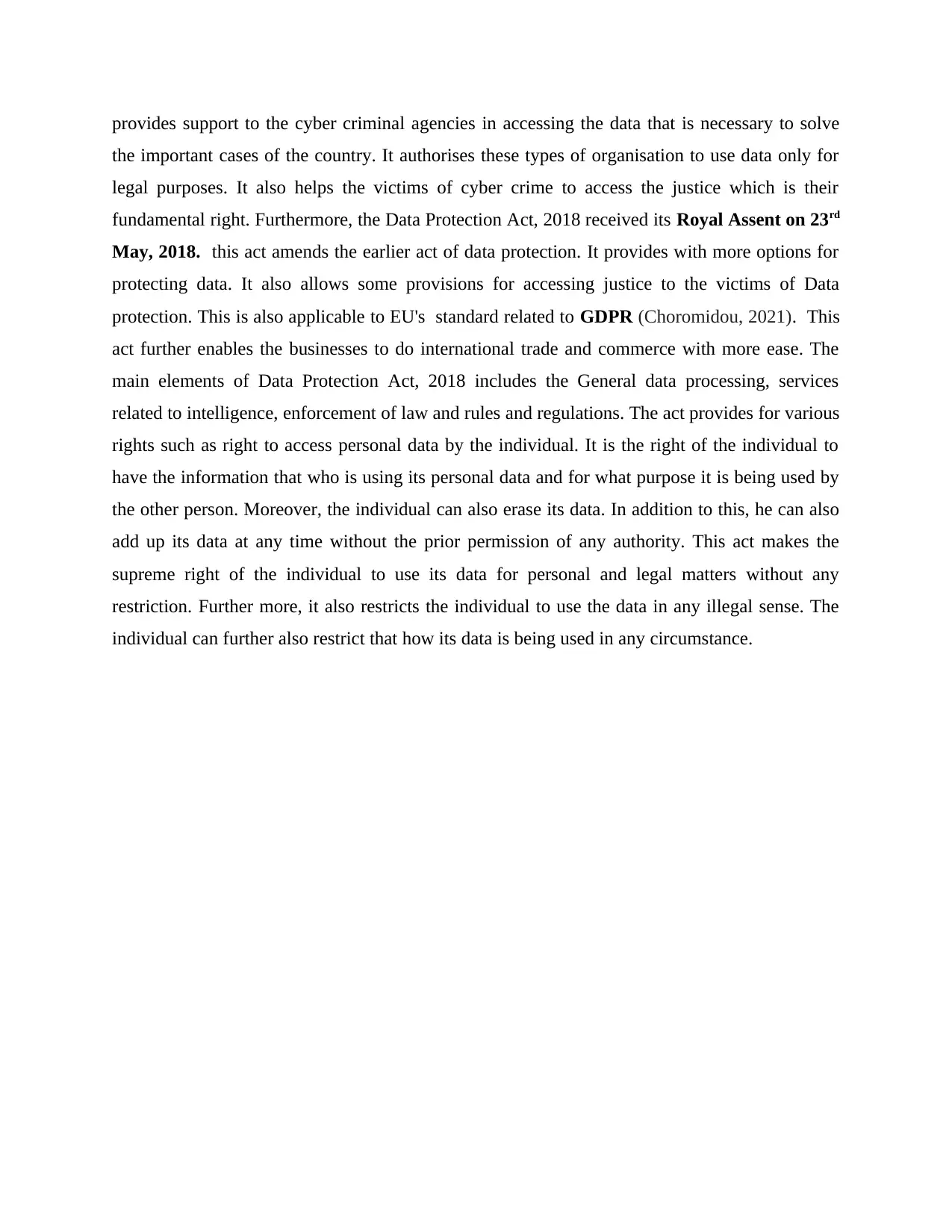
provides support to the cyber criminal agencies in accessing the data that is necessary to solve
the important cases of the country. It authorises these types of organisation to use data only for
legal purposes. It also helps the victims of cyber crime to access the justice which is their
fundamental right. Furthermore, the Data Protection Act, 2018 received its Royal Assent on 23rd
May, 2018. this act amends the earlier act of data protection. It provides with more options for
protecting data. It also allows some provisions for accessing justice to the victims of Data
protection. This is also applicable to EU's standard related to GDPR (Choromidou, 2021). This
act further enables the businesses to do international trade and commerce with more ease. The
main elements of Data Protection Act, 2018 includes the General data processing, services
related to intelligence, enforcement of law and rules and regulations. The act provides for various
rights such as right to access personal data by the individual. It is the right of the individual to
have the information that who is using its personal data and for what purpose it is being used by
the other person. Moreover, the individual can also erase its data. In addition to this, he can also
add up its data at any time without the prior permission of any authority. This act makes the
supreme right of the individual to use its data for personal and legal matters without any
restriction. Further more, it also restricts the individual to use the data in any illegal sense. The
individual can further also restrict that how its data is being used in any circumstance.
the important cases of the country. It authorises these types of organisation to use data only for
legal purposes. It also helps the victims of cyber crime to access the justice which is their
fundamental right. Furthermore, the Data Protection Act, 2018 received its Royal Assent on 23rd
May, 2018. this act amends the earlier act of data protection. It provides with more options for
protecting data. It also allows some provisions for accessing justice to the victims of Data
protection. This is also applicable to EU's standard related to GDPR (Choromidou, 2021). This
act further enables the businesses to do international trade and commerce with more ease. The
main elements of Data Protection Act, 2018 includes the General data processing, services
related to intelligence, enforcement of law and rules and regulations. The act provides for various
rights such as right to access personal data by the individual. It is the right of the individual to
have the information that who is using its personal data and for what purpose it is being used by
the other person. Moreover, the individual can also erase its data. In addition to this, he can also
add up its data at any time without the prior permission of any authority. This act makes the
supreme right of the individual to use its data for personal and legal matters without any
restriction. Further more, it also restricts the individual to use the data in any illegal sense. The
individual can further also restrict that how its data is being used in any circumstance.
Paraphrase This Document
Need a fresh take? Get an instant paraphrase of this document with our AI Paraphraser
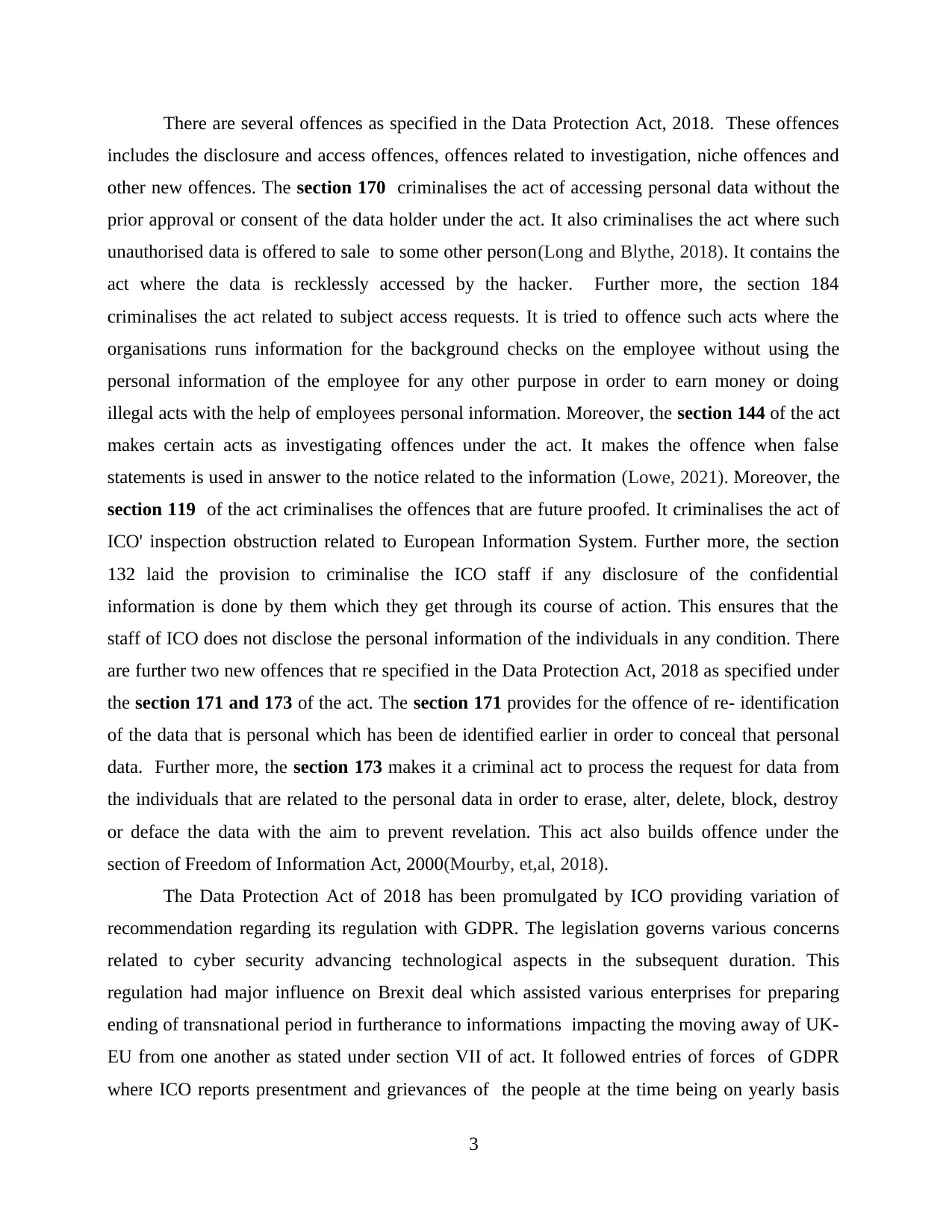
There are several offences as specified in the Data Protection Act, 2018. These offences
includes the disclosure and access offences, offences related to investigation, niche offences and
other new offences. The section 170 criminalises the act of accessing personal data without the
prior approval or consent of the data holder under the act. It also criminalises the act where such
unauthorised data is offered to sale to some other person(Long and Blythe, 2018). It contains the
act where the data is recklessly accessed by the hacker. Further more, the section 184
criminalises the act related to subject access requests. It is tried to offence such acts where the
organisations runs information for the background checks on the employee without using the
personal information of the employee for any other purpose in order to earn money or doing
illegal acts with the help of employees personal information. Moreover, the section 144 of the act
makes certain acts as investigating offences under the act. It makes the offence when false
statements is used in answer to the notice related to the information (Lowe, 2021). Moreover, the
section 119 of the act criminalises the offences that are future proofed. It criminalises the act of
ICO' inspection obstruction related to European Information System. Further more, the section
132 laid the provision to criminalise the ICO staff if any disclosure of the confidential
information is done by them which they get through its course of action. This ensures that the
staff of ICO does not disclose the personal information of the individuals in any condition. There
are further two new offences that re specified in the Data Protection Act, 2018 as specified under
the section 171 and 173 of the act. The section 171 provides for the offence of re- identification
of the data that is personal which has been de identified earlier in order to conceal that personal
data. Further more, the section 173 makes it a criminal act to process the request for data from
the individuals that are related to the personal data in order to erase, alter, delete, block, destroy
or deface the data with the aim to prevent revelation. This act also builds offence under the
section of Freedom of Information Act, 2000(Mourby, et,al, 2018).
The Data Protection Act of 2018 has been promulgated by ICO providing variation of
recommendation regarding its regulation with GDPR. The legislation governs various concerns
related to cyber security advancing technological aspects in the subsequent duration. This
regulation had major influence on Brexit deal which assisted various enterprises for preparing
ending of transnational period in furtherance to informations impacting the moving away of UK-
EU from one another as stated under section VII of act. It followed entries of forces of GDPR
where ICO reports presentment and grievances of the people at the time being on yearly basis
3
includes the disclosure and access offences, offences related to investigation, niche offences and
other new offences. The section 170 criminalises the act of accessing personal data without the
prior approval or consent of the data holder under the act. It also criminalises the act where such
unauthorised data is offered to sale to some other person(Long and Blythe, 2018). It contains the
act where the data is recklessly accessed by the hacker. Further more, the section 184
criminalises the act related to subject access requests. It is tried to offence such acts where the
organisations runs information for the background checks on the employee without using the
personal information of the employee for any other purpose in order to earn money or doing
illegal acts with the help of employees personal information. Moreover, the section 144 of the act
makes certain acts as investigating offences under the act. It makes the offence when false
statements is used in answer to the notice related to the information (Lowe, 2021). Moreover, the
section 119 of the act criminalises the offences that are future proofed. It criminalises the act of
ICO' inspection obstruction related to European Information System. Further more, the section
132 laid the provision to criminalise the ICO staff if any disclosure of the confidential
information is done by them which they get through its course of action. This ensures that the
staff of ICO does not disclose the personal information of the individuals in any condition. There
are further two new offences that re specified in the Data Protection Act, 2018 as specified under
the section 171 and 173 of the act. The section 171 provides for the offence of re- identification
of the data that is personal which has been de identified earlier in order to conceal that personal
data. Further more, the section 173 makes it a criminal act to process the request for data from
the individuals that are related to the personal data in order to erase, alter, delete, block, destroy
or deface the data with the aim to prevent revelation. This act also builds offence under the
section of Freedom of Information Act, 2000(Mourby, et,al, 2018).
The Data Protection Act of 2018 has been promulgated by ICO providing variation of
recommendation regarding its regulation with GDPR. The legislation governs various concerns
related to cyber security advancing technological aspects in the subsequent duration. This
regulation had major influence on Brexit deal which assisted various enterprises for preparing
ending of transnational period in furtherance to informations impacting the moving away of UK-
EU from one another as stated under section VII of act. It followed entries of forces of GDPR
where ICO reports presentment and grievances of the people at the time being on yearly basis
3
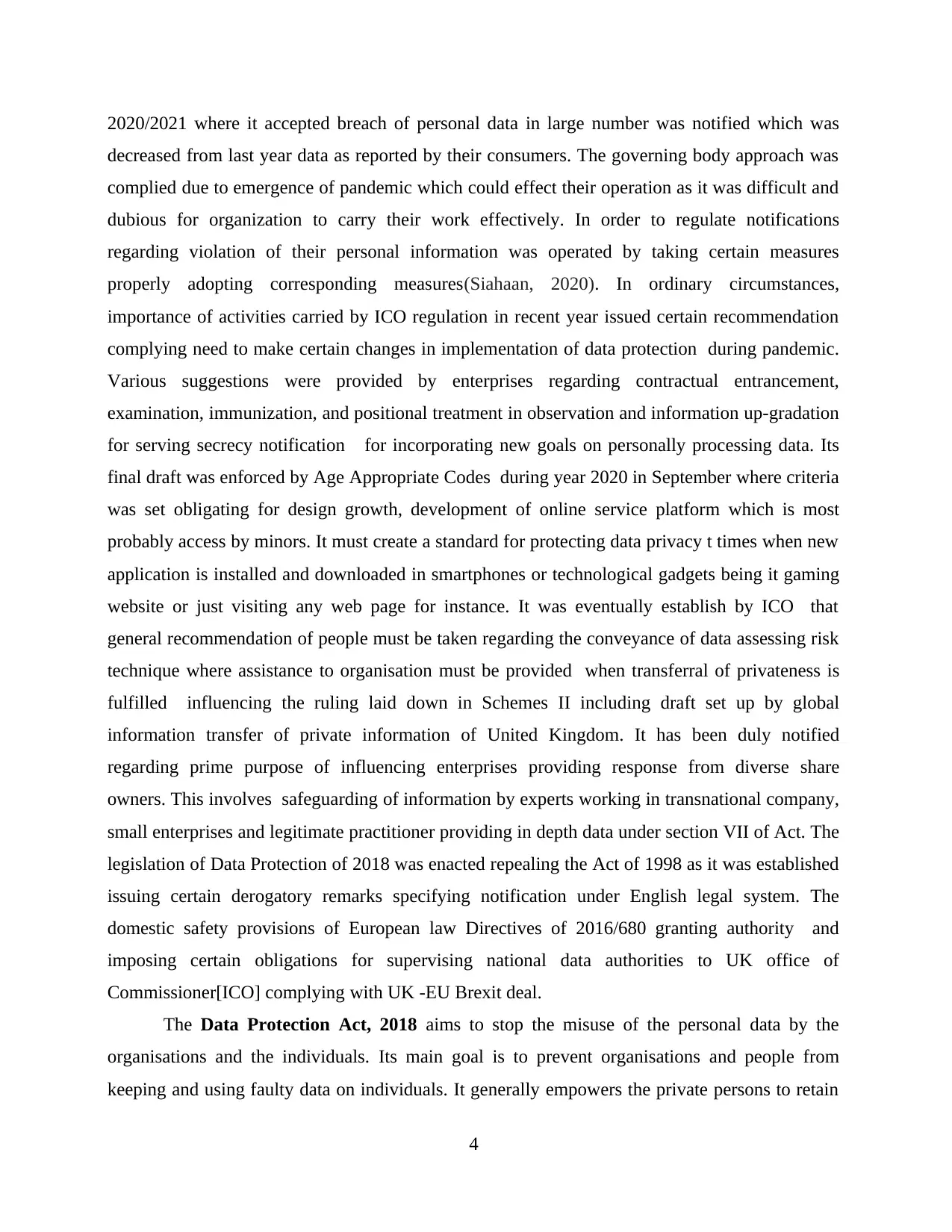
2020/2021 where it accepted breach of personal data in large number was notified which was
decreased from last year data as reported by their consumers. The governing body approach was
complied due to emergence of pandemic which could effect their operation as it was difficult and
dubious for organization to carry their work effectively. In order to regulate notifications
regarding violation of their personal information was operated by taking certain measures
properly adopting corresponding measures(Siahaan, 2020). In ordinary circumstances,
importance of activities carried by ICO regulation in recent year issued certain recommendation
complying need to make certain changes in implementation of data protection during pandemic.
Various suggestions were provided by enterprises regarding contractual entrancement,
examination, immunization, and positional treatment in observation and information up-gradation
for serving secrecy notification for incorporating new goals on personally processing data. Its
final draft was enforced by Age Appropriate Codes during year 2020 in September where criteria
was set obligating for design growth, development of online service platform which is most
probably access by minors. It must create a standard for protecting data privacy t times when new
application is installed and downloaded in smartphones or technological gadgets being it gaming
website or just visiting any web page for instance. It was eventually establish by ICO that
general recommendation of people must be taken regarding the conveyance of data assessing risk
technique where assistance to organisation must be provided when transferral of privateness is
fulfilled influencing the ruling laid down in Schemes II including draft set up by global
information transfer of private information of United Kingdom. It has been duly notified
regarding prime purpose of influencing enterprises providing response from diverse share
owners. This involves safeguarding of information by experts working in transnational company,
small enterprises and legitimate practitioner providing in depth data under section VII of Act. The
legislation of Data Protection of 2018 was enacted repealing the Act of 1998 as it was established
issuing certain derogatory remarks specifying notification under English legal system. The
domestic safety provisions of European law Directives of 2016/680 granting authority and
imposing certain obligations for supervising national data authorities to UK office of
Commissioner[ICO] complying with UK -EU Brexit deal.
The Data Protection Act, 2018 aims to stop the misuse of the personal data by the
organisations and the individuals. Its main goal is to prevent organisations and people from
keeping and using faulty data on individuals. It generally empowers the private persons to retain
4
decreased from last year data as reported by their consumers. The governing body approach was
complied due to emergence of pandemic which could effect their operation as it was difficult and
dubious for organization to carry their work effectively. In order to regulate notifications
regarding violation of their personal information was operated by taking certain measures
properly adopting corresponding measures(Siahaan, 2020). In ordinary circumstances,
importance of activities carried by ICO regulation in recent year issued certain recommendation
complying need to make certain changes in implementation of data protection during pandemic.
Various suggestions were provided by enterprises regarding contractual entrancement,
examination, immunization, and positional treatment in observation and information up-gradation
for serving secrecy notification for incorporating new goals on personally processing data. Its
final draft was enforced by Age Appropriate Codes during year 2020 in September where criteria
was set obligating for design growth, development of online service platform which is most
probably access by minors. It must create a standard for protecting data privacy t times when new
application is installed and downloaded in smartphones or technological gadgets being it gaming
website or just visiting any web page for instance. It was eventually establish by ICO that
general recommendation of people must be taken regarding the conveyance of data assessing risk
technique where assistance to organisation must be provided when transferral of privateness is
fulfilled influencing the ruling laid down in Schemes II including draft set up by global
information transfer of private information of United Kingdom. It has been duly notified
regarding prime purpose of influencing enterprises providing response from diverse share
owners. This involves safeguarding of information by experts working in transnational company,
small enterprises and legitimate practitioner providing in depth data under section VII of Act. The
legislation of Data Protection of 2018 was enacted repealing the Act of 1998 as it was established
issuing certain derogatory remarks specifying notification under English legal system. The
domestic safety provisions of European law Directives of 2016/680 granting authority and
imposing certain obligations for supervising national data authorities to UK office of
Commissioner[ICO] complying with UK -EU Brexit deal.
The Data Protection Act, 2018 aims to stop the misuse of the personal data by the
organisations and the individuals. Its main goal is to prevent organisations and people from
keeping and using faulty data on individuals. It generally empowers the private persons to retain
4
⊘ This is a preview!⊘
Do you want full access?
Subscribe today to unlock all pages.

Trusted by 1+ million students worldwide
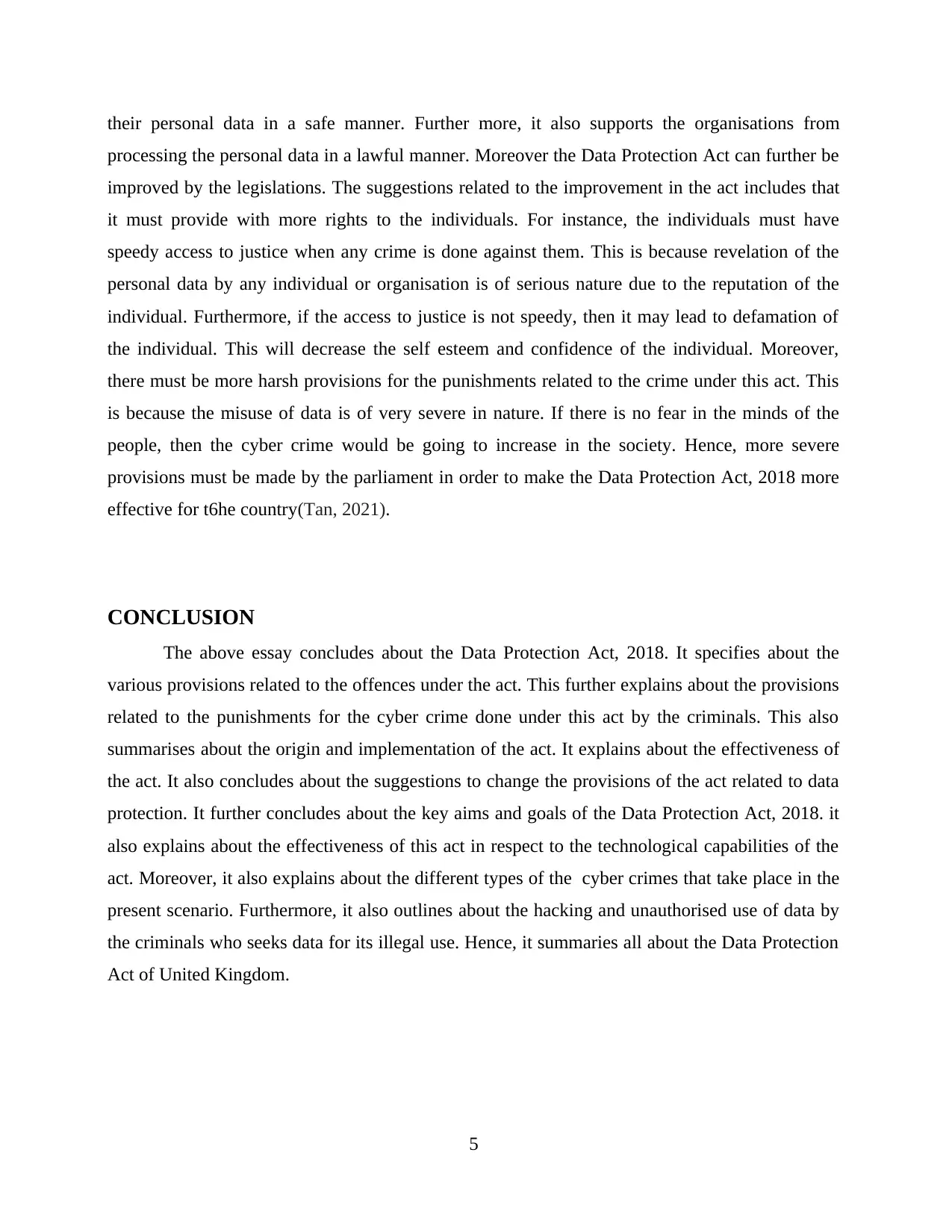
their personal data in a safe manner. Further more, it also supports the organisations from
processing the personal data in a lawful manner. Moreover the Data Protection Act can further be
improved by the legislations. The suggestions related to the improvement in the act includes that
it must provide with more rights to the individuals. For instance, the individuals must have
speedy access to justice when any crime is done against them. This is because revelation of the
personal data by any individual or organisation is of serious nature due to the reputation of the
individual. Furthermore, if the access to justice is not speedy, then it may lead to defamation of
the individual. This will decrease the self esteem and confidence of the individual. Moreover,
there must be more harsh provisions for the punishments related to the crime under this act. This
is because the misuse of data is of very severe in nature. If there is no fear in the minds of the
people, then the cyber crime would be going to increase in the society. Hence, more severe
provisions must be made by the parliament in order to make the Data Protection Act, 2018 more
effective for t6he country(Tan, 2021).
CONCLUSION
The above essay concludes about the Data Protection Act, 2018. It specifies about the
various provisions related to the offences under the act. This further explains about the provisions
related to the punishments for the cyber crime done under this act by the criminals. This also
summarises about the origin and implementation of the act. It explains about the effectiveness of
the act. It also concludes about the suggestions to change the provisions of the act related to data
protection. It further concludes about the key aims and goals of the Data Protection Act, 2018. it
also explains about the effectiveness of this act in respect to the technological capabilities of the
act. Moreover, it also explains about the different types of the cyber crimes that take place in the
present scenario. Furthermore, it also outlines about the hacking and unauthorised use of data by
the criminals who seeks data for its illegal use. Hence, it summaries all about the Data Protection
Act of United Kingdom.
5
processing the personal data in a lawful manner. Moreover the Data Protection Act can further be
improved by the legislations. The suggestions related to the improvement in the act includes that
it must provide with more rights to the individuals. For instance, the individuals must have
speedy access to justice when any crime is done against them. This is because revelation of the
personal data by any individual or organisation is of serious nature due to the reputation of the
individual. Furthermore, if the access to justice is not speedy, then it may lead to defamation of
the individual. This will decrease the self esteem and confidence of the individual. Moreover,
there must be more harsh provisions for the punishments related to the crime under this act. This
is because the misuse of data is of very severe in nature. If there is no fear in the minds of the
people, then the cyber crime would be going to increase in the society. Hence, more severe
provisions must be made by the parliament in order to make the Data Protection Act, 2018 more
effective for t6he country(Tan, 2021).
CONCLUSION
The above essay concludes about the Data Protection Act, 2018. It specifies about the
various provisions related to the offences under the act. This further explains about the provisions
related to the punishments for the cyber crime done under this act by the criminals. This also
summarises about the origin and implementation of the act. It explains about the effectiveness of
the act. It also concludes about the suggestions to change the provisions of the act related to data
protection. It further concludes about the key aims and goals of the Data Protection Act, 2018. it
also explains about the effectiveness of this act in respect to the technological capabilities of the
act. Moreover, it also explains about the different types of the cyber crimes that take place in the
present scenario. Furthermore, it also outlines about the hacking and unauthorised use of data by
the criminals who seeks data for its illegal use. Hence, it summaries all about the Data Protection
Act of United Kingdom.
5
Paraphrase This Document
Need a fresh take? Get an instant paraphrase of this document with our AI Paraphraser

6
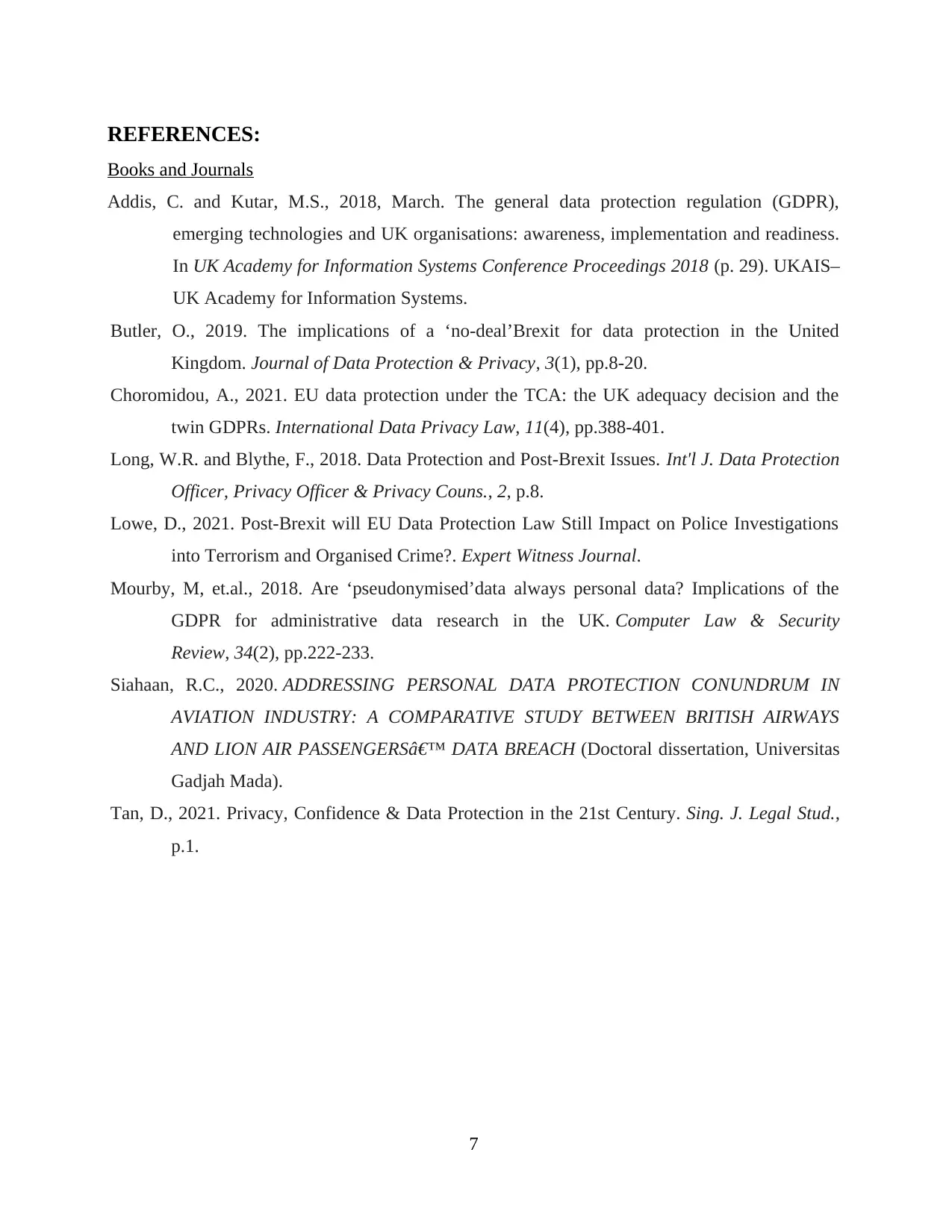
REFERENCES:
Books and Journals
Addis, C. and Kutar, M.S., 2018, March. The general data protection regulation (GDPR),
emerging technologies and UK organisations: awareness, implementation and readiness.
In UK Academy for Information Systems Conference Proceedings 2018 (p. 29). UKAIS–
UK Academy for Information Systems.
Butler, O., 2019. The implications of a ‘no-deal’Brexit for data protection in the United
Kingdom. Journal of Data Protection & Privacy, 3(1), pp.8-20.
Choromidou, A., 2021. EU data protection under the TCA: the UK adequacy decision and the
twin GDPRs. International Data Privacy Law, 11(4), pp.388-401.
Long, W.R. and Blythe, F., 2018. Data Protection and Post-Brexit Issues. Int'l J. Data Protection
Officer, Privacy Officer & Privacy Couns., 2, p.8.
Lowe, D., 2021. Post-Brexit will EU Data Protection Law Still Impact on Police Investigations
into Terrorism and Organised Crime?. Expert Witness Journal.
Mourby, M, et.al., 2018. Are ‘pseudonymised’data always personal data? Implications of the
GDPR for administrative data research in the UK. Computer Law & Security
Review, 34(2), pp.222-233.
Siahaan, R.C., 2020. ADDRESSING PERSONAL DATA PROTECTION CONUNDRUM IN
AVIATION INDUSTRY: A COMPARATIVE STUDY BETWEEN BRITISH AIRWAYS
AND LION AIR PASSENGERS’ DATA BREACH (Doctoral dissertation, Universitas
Gadjah Mada).
Tan, D., 2021. Privacy, Confidence & Data Protection in the 21st Century. Sing. J. Legal Stud.,
p.1.
7
Books and Journals
Addis, C. and Kutar, M.S., 2018, March. The general data protection regulation (GDPR),
emerging technologies and UK organisations: awareness, implementation and readiness.
In UK Academy for Information Systems Conference Proceedings 2018 (p. 29). UKAIS–
UK Academy for Information Systems.
Butler, O., 2019. The implications of a ‘no-deal’Brexit for data protection in the United
Kingdom. Journal of Data Protection & Privacy, 3(1), pp.8-20.
Choromidou, A., 2021. EU data protection under the TCA: the UK adequacy decision and the
twin GDPRs. International Data Privacy Law, 11(4), pp.388-401.
Long, W.R. and Blythe, F., 2018. Data Protection and Post-Brexit Issues. Int'l J. Data Protection
Officer, Privacy Officer & Privacy Couns., 2, p.8.
Lowe, D., 2021. Post-Brexit will EU Data Protection Law Still Impact on Police Investigations
into Terrorism and Organised Crime?. Expert Witness Journal.
Mourby, M, et.al., 2018. Are ‘pseudonymised’data always personal data? Implications of the
GDPR for administrative data research in the UK. Computer Law & Security
Review, 34(2), pp.222-233.
Siahaan, R.C., 2020. ADDRESSING PERSONAL DATA PROTECTION CONUNDRUM IN
AVIATION INDUSTRY: A COMPARATIVE STUDY BETWEEN BRITISH AIRWAYS
AND LION AIR PASSENGERS’ DATA BREACH (Doctoral dissertation, Universitas
Gadjah Mada).
Tan, D., 2021. Privacy, Confidence & Data Protection in the 21st Century. Sing. J. Legal Stud.,
p.1.
7
⊘ This is a preview!⊘
Do you want full access?
Subscribe today to unlock all pages.

Trusted by 1+ million students worldwide
1 out of 9
Related Documents
Your All-in-One AI-Powered Toolkit for Academic Success.
+13062052269
info@desklib.com
Available 24*7 on WhatsApp / Email
![[object Object]](/_next/static/media/star-bottom.7253800d.svg)
Unlock your academic potential
Copyright © 2020–2026 A2Z Services. All Rights Reserved. Developed and managed by ZUCOL.





